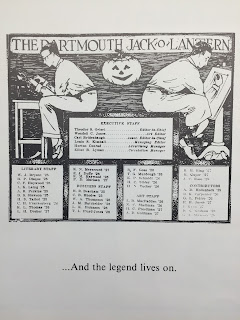 In 1981, Dartmouth paid homage to one of its favorite alums with the Winter Carnival theme “Hanover Hears a Who.” It’s not the only time we’ve done it, “How the Grinch Stole Carnival,” 1992 was also inspired by Geisel, as was one of the most famous themes “Oh, the Places it Snows,” which commemorated what would have been the doctor’s 100th birthday. Dr. Seuss’s books take up nearly an entire shelf in the Alumni section of the stacks, and among them is the Winter Carnival issue of the Jack-O-Lantern from 1981. The issue served as the official program for the celebrations, and the Jack-O got the honors because of Seuss’s legacy as editor-in-chief.
In 1981, Dartmouth paid homage to one of its favorite alums with the Winter Carnival theme “Hanover Hears a Who.” It’s not the only time we’ve done it, “How the Grinch Stole Carnival,” 1992 was also inspired by Geisel, as was one of the most famous themes “Oh, the Places it Snows,” which commemorated what would have been the doctor’s 100th birthday. Dr. Seuss’s books take up nearly an entire shelf in the Alumni section of the stacks, and among them is the Winter Carnival issue of the Jack-O-Lantern from 1981. The issue served as the official program for the celebrations, and the Jack-O got the honors because of Seuss’s legacy as editor-in-chief.Theodore Geisel served as a cartoonist as well as the the Editor-in-Chief of the Jack-O during his time at Dartmouth, but was unfortunately forced to quit after he was punished by the administration, supposedly for having alcohol, which in 1925, was very much in violation of prohibition. How very Dartmouth. Unbeknownst to the administration, he continued his work for the magazine under the pen name Dr. Seuss, and a legend was born.
Aside from the four pages dedicated to the Winter Carnival council members, the official schedule, and the history of the event, the issue is chock-full of articles and jokes centered around their most famous alum. The articles include “A critical analysis of the philosophy of Dr. Seuss,” a primer for Soviet children by “Dr. Seusslov,” “Green Eggs and Hamlet,” “Why the Grinch Stole Christmas” (“because of an unresolved homosexual Oedipal complex”) and “Horton hears the Who.”
The most relatable, however, is probably “How the Grinch Stole Carnival,” a very Seussian poem in rhythm and style about how the Grinch doesn’t like the preps in Prepville and how excited they are about the festivities. He proceeds to take all the paraphernalia from the frats and blows up Hanover.
The issue also includes a “Seussian” crossword with clues like “try your own name,” and “maybe I spelled it wrong.” The directions go from across and down to “across, but then sharply downward,” and “down, then slant off to the side, kinda.”
Although the issue might seem to be poking fun of the great illustrator and author, it’s done with respect. The letter from the editor is sincere and credits Seuss for all he has done. The issue ends with a picture of the Jack-O when Geisel was Editor-in-Chief with the caption “…And the legend lives on.” Plus, Seuss wasn’t easily offended or likely to take satire the wrong way. After all, he did illustrate a joke book titled Boners: Being a Collection of Schoolboy Wisdom, or Knowledge as it is Sometimes Written, Compiled from Classrooms and Examination Papers!
Posted for Maggie Baird '18

